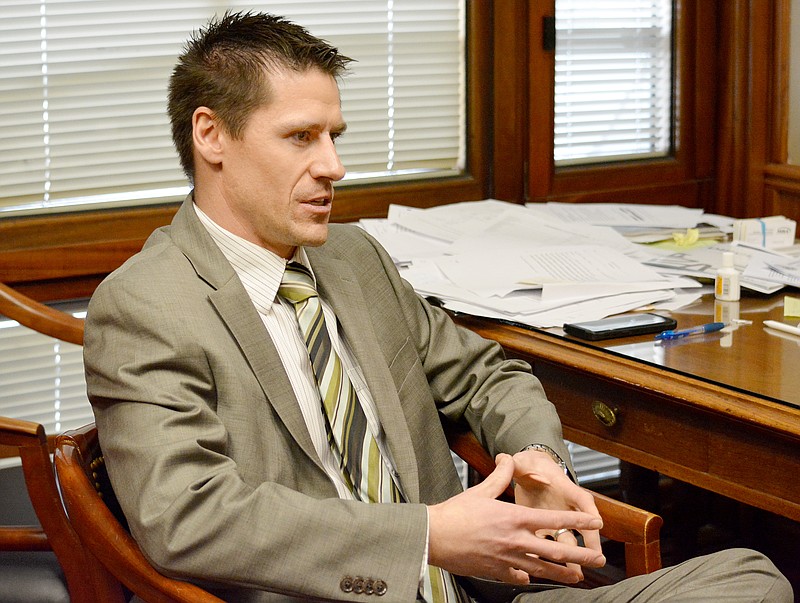Nearly five years after voters amended the state Constitution to require the legislature to abide by transparency laws, the Missouri Senate is advancing a bill allowing lawmakers to withhold a wide swath of records from the public.
Any record of a state lawmaker or their staff pertaining to "legislation or the legislative process" would be closed off to public scrutiny, except for those offered during a public meeting or involving a lobbyist, under legislation sponsored by Sen. Andrew Koenig, R-Manchester.
The bill also closes records held by the government pertaining to a constituent, though lobbyists wouldn't be covered under this provision.
Koenig defended the proposal at a legislative hearing earlier this month, arguing that sometimes lawmakers "need to be able to think out loud with your staff and before you get a finished product."
But to government transparency advocates, the push represents lawmakers trying to carve themselves out of a constitutional mandate imposed on them by the voters of Missouri.
"The legislature really doesn't like the fact that the people amended the Constitution to say that they had to provide a greater level of transparency than a lot of these legislators are comfortable with," said David Roland, director of litigation at the libertarian nonprofit Freedom Center of Missouri. "But that's what the people decided. And now legislators are trying to insulate themselves from oversight by the public."
Koenig has paired down his bill considerably since it was first introduced, taking into account concerns expressed by those who felt the original version would have severely undermined the Missouri Sunshine Law -- the 50-year-old accountability law designed to ensure the public has access to government records and meetings.
Gone are provisions that created a new type of exemption to the Sunshine Law for "transitory records," which it defined as records that are not final documents or "do not have substantial administrative or operational value." The original bill also exempted inter-agency or intra-agency memoranda or letters from the Sunshine Law.
"I can tell you that (Sen. Koenig) has done a great job, I think, with addressing some of the concerns that were raised in committee," Sen. Karla Eslinger, chair of the Senate Governmental Accountability Committee, said Thursday morning before Koenig's bill was sent to the full Senate on a party-line vote.
"Now I know that as well as anybody else does, that anytime that a piece of legislation is before a committee and gets to the floor, it has more opportunity to get better," she said, "more opportunity as it goes through the process."
But in addition to exempting some legislative records from the Sunshine Law, the bill also changes the definition of public meeting in a method critics contend would allow governmental bodies, such as city councils and school boards, to discuss public business behind closed doors.
"It invites public governmental bodies to game the system to do an end run around transparency," Roland said, "and could dramatically reduce not only citizens' awareness of what's being discussed, but citizen input into the deliberations."
The bill also adds language to the Sunshine Law to allow government agencies to charge citizens for time spent redacting information from public records.
The change has been a priority of Gov. Mike Parson since 2021, when the Missouri Supreme Court ruled his office had been improperly redacting records, charging exorbitant fees and knowingly and purposely violating the state's open records law.
Parson came into office in 2018 vowing to improve transparency in the governor's office after his predecessor was routinely criticized for trying to subvert the Sunshine Law.
But despite that early pledge, Parson has had a rocky relationship with open records requirements.
The governor was reprimanded by former Attorney General Eric Schmitt in 2019 for citing the First Amendment of the U.S. Constitution to justify redacting public records. He's also been criticized for withholding records regarding the resignation of his cabinet members and refusing for months to turn over documents regarding his appointee to take over the attorney general's office.
More recently, Parson's administration has been criticized for withholding information from public records based on a broad interpretation of a donor privacy law.
Elad Gross, the attorney whose lawsuit led to the 2021 Supreme Court decision against Parson, said the language in the new version of Koenig's legislation pertaining to charging fees for redacting information is "very confusing."
"The law requires that the government separate open records from closed records whether or not there is a request, and this bill keeps that provision in," Gross said. "But then it authorizes redaction fees, and excludes the cost of time needed to separate redacted materials. So if the government needs to make redactions before a requester even makes a request, which redactions are they able to charge for?"
Asked about the bill while meeting with reporters last week, Parson said his administration tries to be open and transparent.
"But the reality is," he said, "there's no question that the Sunshine Laws are being abused every day."
As evidence, Parson pointed to a records request his office allegedly received asking for all communications that included the word "COVID."
Roland called the governor's answer "frustrating."
"What does he mean by abuse?" Roland said. "The fact that citizens are asking for information that he would prefer they not have or that he thinks they should not have access to? To label a citizen's request as an abuse of the Sunshine Law says far more about the politician's perspective on transparency than it does about the quality or importance of the citizen's request."
The Missouri Independent, www.missouriindependent.com, is a nonprofit, nonpartisan news organization covering state government and its impact on Missourians.

